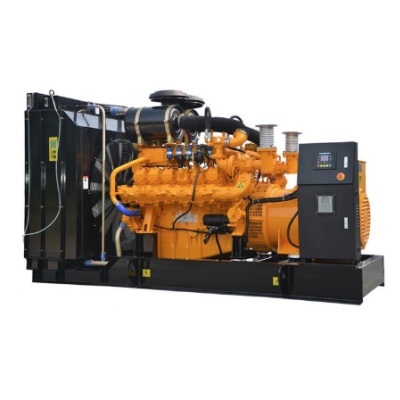
When it comes to backup power, generators are essential for homes, businesses, hospitals, construction sites, and countless other settings. But beyond power output and reliability, one of the most common and important questions people ask is: how much gas does a generator use? Understanding generator fuel consumption is critical for planning, budgeting, and ensuring uninterrupted power during outages or off-grid operations.
The answer isn’t one-size-fits-all. A generator’s gas usage depends on many factors, including its size, type, load, fuel source, and operating environment. Whether you’re considering a diesel generator, a gas generator, or a natural gas generator, this guide breaks down everything you need to know—from fuel usage calculations to the best generator options available from leading manufacturers like DONGCHAI POWER.
The Main Types of Generators and Their Fuel Sources
To understand fuel consumption, you first need to know the different types of generators and the fuel they use. Each type has its own efficiency level, usage scenario, and operating cost.
Diesel Generators
Diesel generators are among the most fuel-efficient and durable options available. They are widely used in industrial, commercial, and residential applications. A diesel generator set typically consumes less fuel and offers better long-term performance, especially when operating under heavy loads.
Popular models include:
Gasoline Generators
Gasoline (or petrol) generators are commonly used for portable or short-term power needs. They are inexpensive upfront but consume more fuel per kilowatt-hour compared to diesel generators. They’re ideal for light-duty use but not recommended for continuous operations.
Natural Gas Generators
Natural gas generators are clean-burning and suitable for locations with access to a centralized gas line. They are often used as standby units for homes and businesses. While efficient, they may not deliver the same torque or fuel economy as diesel generators under high load.
Propane and LPG Generators
These generators use liquid propane or liquefied petroleum gas (LPG) and are often part of dual-fuel systems. They are clean and stable but generally less efficient than diesel under continuous high load.
What Type of Gas Do Generators Use?
Generators can run on several types of fuel:
Gasoline (petrol)
Diesel fuel
Propane (LPG)
Natural gas
The fuel type affects not just consumption but also cost, availability, storage life, and emissions. Diesel, for example, offers high energy density and is preferred for long-running industrial applications. That’s why many businesses choose diesel generators for sale from trusted suppliers like DONGCHAI POWER.
Calculating Fuel Usage of Gas and Diesel Generators
Fuel consumption is typically measured in gallons (or liters) per hour. To estimate how much gas a generator uses, you need to consider the generator's wattage, load, and fuel efficiency.
Power Output and Load Matter
The wattage of your generator significantly impacts fuel usage. A 5,000-watt generator running at 50% load will consume less fuel than the same generator running at 100% load.
Here’s a simple rule: the higher the load, the more fuel consumed per hour.
Fuel Consumption Formula and Cost Estimation
To calculate gas usage, use this basic formula:
Fuel Consumption (GPH) = (kW load × Fuel Rate per kWh)
For diesel generators, the fuel rate is typically between 0.24 to 0.28 liters per kWh. For gasoline generators, it can go up to 0.4 liters per kWh.
Example Fuel Usage Calculation
Let’s say you're using a 10kW diesel generator at 75% load (7.5kW load):
Over 24 hours: 1.95 × 24 = 46.8 liters/day
Now compare this to a gasoline generator with a higher fuel rate:
What Affects Fuel Consumption in Generators?
Several internal and external factors influence how much gas or diesel your generator uses.
Generator Size and Capacity
Larger generators like a 30kW diesel generator consume more fuel than smaller models, but they may be more efficient when running multiple appliances at once. A well-sized generator avoids underloading and overloading—both of which waste fuel.
Type of Fuel Used
Diesel fuel offers superior energy density, which means less fuel is needed to generate the same amount of electricity. In contrast, LPG and natural gas may be cleaner but require more volume to match diesel’s output.
Climate and Environmental Conditions
Weather plays a significant role in generator efficiency. Cold or humid weather can make engines work harder, increasing fuel consumption. High altitudes can also reduce engine performance.
Usage Frequency and Duration
A generator running continuously will consume more gas than one used intermittently. However, diesel generators are built for longer continuous operation and can sustain loads for extended periods with better fuel economy.
![how much gas does a generator use]()
What’s the Cost of Running a Generator on Gas?
The cost of operation depends on fuel prices, generator efficiency, and usage hours.
Gasoline Generators
These have lower upfront costs but higher operating expenses due to fuel inefficiency. They may consume up to 0.75 – 1 gallon per hour at moderate load.
Diesel Generators
Diesel generators are more efficient. A 20kW diesel generator running at half load might use only 1.5 to 2.5 liters/hour, making it a cost-effective choice for long-term use.
Propane and LPG Generators
These tend to consume more fuel than diesel but produce cleaner emissions. They’re useful where environmentally friendly operation is a priority.
Natural Gas Generators
Great for connected environments, these units have low per-hour fuel costs, but performance may vary under heavy loads.
Additional Factors That Influence How Much Gas Your Generator Uses
Understanding these variables can help you plan fuel needs and choose the right generator for your application.
Power Demand and Generator Size
A small generator running at full capacity often uses more gas than a larger generator running at 50%. Choosing the right size helps optimize fuel use.
Age and Condition of the Generator
Older generators or poorly maintained units consume more fuel. Regular servicing of diesel generators, including filter changes and oil checks, ensures optimal performance.
Generator Efficiency Rating
High-efficiency generators feature advanced fuel injection systems and better combustion management. DONGCHAI POWER’s silent generator series and container generator units are built with fuel economy in mind.
Fuel Storage and Delivery
Using contaminated or stale gasoline can increase fuel consumption and damage the engine. Diesel has a longer shelf life, making it ideal for long-term storage in emergency backup systems.
DONGCHAI POWER: Supplying Fuel-Efficient Generator Solutions
At DONGCHAI POWER, we manufacture and supply a wide range of generator systems designed for efficiency, durability, and continuous operation. Our product range includes:
Diesel generators from 5kW to 4000kW
Silent generator units for residential and low-noise environments
Trailer generator systems for mobile projects
Open generator sets for easy access and maintenance
Container generator units for industrial-grade backup
Light tower generator systems for construction and night operations
Gas generators and LPG generator models for clean fuel options
Reefer generator units for refrigerated transport
Synchronization generator systems for scalable power applications
Whether you're looking for a diesel generator for sale or a custom-built power solution, DONGCHAI POWER has the expertise and product lineup to meet your needs. Visit our full product catalog at https://www.dcgenset.com/products.html.
FAQs
A1: How much gas does a generator use in 24 hours?
Q1: It depends on the generator type and load. A 10kW diesel generator at 75% load may consume around 45–50 liters of diesel in 24 hours. Gasoline generators consume more—up to 70 liters or more in a day.
A2: How much gas does a 10,000 watt generator use?
Q2: A 10,000-watt generator (10kW) usually burns 1.5 to 2.5 gallons of gasoline or 1.8 to 2.2 liters of diesel per hour at 50–75% load. Diesel models are more fuel-efficient at this range.
A3: How much gas does a 3000 watt generator use?
Q3: At 50% load, a 3000-watt gas generator typically uses 0.3 to 0.5 gallons per hour. Diesel versions are rare at this size but would consume less if available.
A4: How much gas does a 4000 watt generator use?
Q4: A 4000-watt gasoline generator may use about 0.5 to 0.8 gallons per hour. Fuel usage varies based on load and engine efficiency.
A5: How much natural gas does a generator use?
Q5: Natural gas generators typically consume between 100 to 150 cubic feet per hour for a 10kW load. Consumption scales with output and load.
A6: How much gas does a generator hold?
Q6: Generator fuel tank size varies. Portable models may hold 1–8 gallons, while large diesel generators can have tanks from 50 to 500+ gallons. Container generators from DONGCHAI POWER offer extended capacity for continuous use.
A7: How much gas does a portable generator use?
Q7: A standard portable generator may use 0.5 to 1.5 gallons of gasoline per hour depending on size and load. Diesel portable units are more fuel-efficient.
A8: How much gas does a 5,000 watt generator use?
Q8: At half load, a 5,000-watt gasoline generator uses around 0.75 gallons per hour. Diesel variants, if available, may cut fuel usage by 20–30%.
A9: How much gas does a 3500 watt generator use?
Q9: A 3500-watt generator generally consumes about 0.4–0.6 gallons per hour at moderate load. Proper load management can improve efficiency.
A10: How much gas does a generator use per hour?
Q10: This depends on size and type. A diesel generator might use 1.5–3 liters per hour for medium loads, while gasoline generators can use 0.5–1.5 gallons/hour. Natural gas and propane usage is measured in cubic feet or pounds per hour, respectively.
Understanding how much gas a generator uses is essential for choosing the right model, estimating fuel costs, and ensuring reliable power. Diesel generators stand out as the most fuel-efficient option, especially for long-term use and high load applications. Whether you need a silent generator for residential backup, a container generator for industrial use, or a reefer generator for cold chain logistics, DONGCHAI POWER offers a wide range of efficient, high-performance solutions.
By considering generator size, fuel type, and usage patterns, you can optimize fuel consumption and reduce operating costs. From diesel to LPG, from trailer-mounted to synchronized systems, there’s a generator solution for every application—backed by the reliability and engineering excellence of DONGCHAI POWER.























